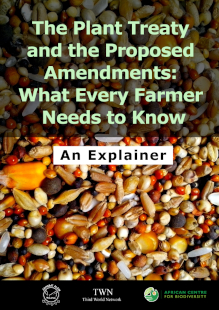|
|
|||
About the Book The International Treaty on Plant Genetic Resources for Food and Agriculture, also known as the Plant Treaty, governs the conservation and sustainable use of seeds and other planting materials used for food and farming. Among other things, it has established a Multilateral System (MLS) to facilitate access to seeds for crop research and development, and to enable the sharing of benefits arising from such use. The operation of the MLS thus far, however, undermines the very farmers’ rights enshrined in the Treaty itself. Even as farmers’ seeds shared through the system are used in research that yields productive outcomes, the farmers’ contributions often go unacknowledged and their right to share in the benefits unrealised. Far from redressing these gaps, amendments currently being proposed for the Treaty may only end up exacerbating them. What is needed instead is an access and benefit-sharing regime that truly upholds the rights of farmers as leading custodians of the world’s seed diversity. Contents What is the Plant Treaty? What is the MLS? What seeds are currently covered in the MLS? What is the role of FAO and member countries under the MLS? What happens if farmers’ seeds enter the MLS? How does it affect farmers’ rights? How does benefit sharing work? Is there any guarantee that farmers get benefits? What are the proposed amendments to the Treaty? How would they affect farmers? What corrective actions are required in the Treaty amendment process, especially in the upcoming meeting of the Governing Body?
|
|||
